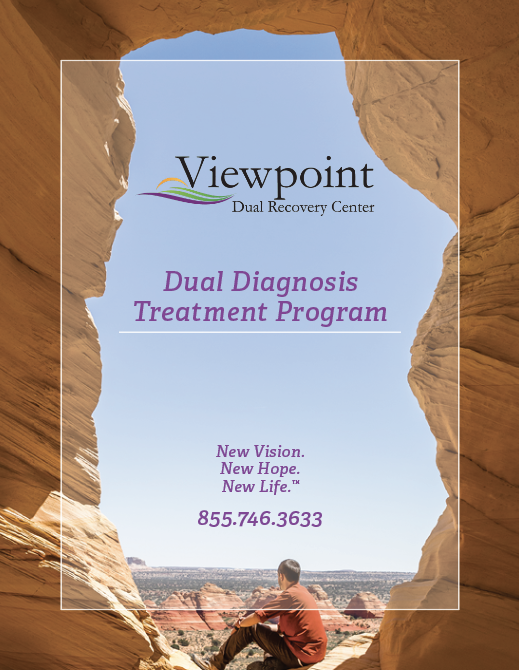- Extended Treatment Program (PHP/IOP/OP)
- Family Workshop
- Dual Diagnosis Recovery in Arizona
- Advantages of Dual Diagnosis Treatment in Arizona
- Symptoms of Dual Diagnoses
- The Importance of Seeking Treatment
- Our Specialized Approach to Dual Diagnoses
 People struggling with mental health concerns are at an increased risk of medication mismanagement. At Viewpoint we offer long-term dual diagnosis treatment for people struggling with mental health and substance use disorder. Each of our treatment modalities is designed to treat mental health issues and substance use disorder simultaneously. We offer dual diagnosis treatment to address a number of complex mental health concerns and substance use disorders. We incorporate multimodal therapeutic approaches designed to support each client and address their individual needs . All of our programs are client-centered, allowing us to work with each individual where they are. Start your new life full of hope and purpose by calling Viewpoint Dual Recovery at 855.746.3633.
People struggling with mental health concerns are at an increased risk of medication mismanagement. At Viewpoint we offer long-term dual diagnosis treatment for people struggling with mental health and substance use disorder. Each of our treatment modalities is designed to treat mental health issues and substance use disorder simultaneously. We offer dual diagnosis treatment to address a number of complex mental health concerns and substance use disorders. We incorporate multimodal therapeutic approaches designed to support each client and address their individual needs . All of our programs are client-centered, allowing us to work with each individual where they are. Start your new life full of hope and purpose by calling Viewpoint Dual Recovery at 855.746.3633.
Extended Treatment Program (PHP/IOP/OP)
In our extended treatment program, each client receives state of the art, evidence-based psychological interventions which include, but are not limited to, psychiatric evaluations and assessments, individualized treatment planning and education for dual diagnosis and treatments. This treatment is achieved through group and individualized therapies and psycho-education groups that include:
- Relapse prevention
- Education on dual-diagnosis
- Close alliances with their primary therapist, psychiatrist, case managers, and entire clinical staff
- Equine therapy
- Art therapy
- Meditation
- Yoga
- Exercise
At our dual diagnosis treatment center, we intrinsically weave life skills training, including social interaction, into all aspects of treatment. Clients are encouraged to set their own goals while our dedicated team of professionals provides support and assistance in ensuring these goals work in conjunction with therapeutic goals. Viewpoint provides vocational and career counseling, as well as access to the numerous educational facilities available around our location.
PROGRAMS INCLUDES:
- Equine therapy
- Somatic experience (SE)
- Music therapy
- Family therapy
- Nutrition, health, and wellness
- Grief counseling
- Meditation and spirituality
- Dialectical behavior therapy (DBT)
- Cognitive-behavioral therapy (CBT)
- Vocational training
“I have been to 13 treatment centers, and this one by far has been the most help to me. Viewpoint has such caring staff. The owners are absolutely amazing. They care to such a great deal for the clients. Their services are absolutely phenomenal. I suffer from trauma, and mental health. They have helped me grow tremendously. If it wasn’t for the work I put in here, enabled by this place, I do not know where I would be in life. Or if I would even be here. If you or your children are suffering from addiction do not hesitate to give them a call. I’d rate 10 stars if I could. If your hurting don’t wait. There is hope!”
Matt G.
“My son was a client at Viewpoint for a little over a year. During that time he was accurately diagnosed and treated for a mental health disorder and addiction. He is now a college student and has a future to look forward to. I cannot thank Dr. Julia Summers, Amy Fackrell, Billy Bilbray as well as the entire staff enough. Michelle in the front office was always pleasant and helpful too. This program addresses individual needs, which was instrumental in my son’s success. The family weekend was educational and eye-opening. I would recommend Viewpoint to anyone suffering from addictions and mental health issues.”
Terri C.
“This facility is amazing at providing the tools and necessary advice to help those find recovery from addiction and mental health disorders. The house managers and clinicians are experienced professional men and women who take the needs of their clients with understanding and compassion. I am sincerely grateful for the spark of wanting and needing recovery that they helped me discover within myself. The housing locations are scenic and a very comfortable homelike environment that makes the focus on healing a much more enjoyable process. Anybody who may need help getting on the positive path you deserve to look into Viewpoint Dual Recovery!!!!”
Christopher F.
Family Workshop
At our dual diagnosis treatment program in Arizona, we often encounter family members who are emotionally hurt and traumatized from watching their children, parents, or siblings surrender to a life clouded by mental illness and addiction. They want their loved ones to be successful in addiction recovery but are unsure if they can do anything to help.
For this reason, we are proud to have developed and integrated a family workshop into our programming for those that would like to participate.
Viewpoint Dual Recovery Center’s Family Workshop helps family members assist their loved ones on the road to recovery from both substance abuse and mental health issues. Family relationships will be improved throughout the development of healthy communication skills, boundary-setting, and family systems education. The goal is to help family members move away from a painful past and towards a loving and more hopeful future.
FAMILY WORKSHOP TOPICS INCLUDE:
- Accountability vs. guilt
- Dual diagnosis education
- Codependency
- Manipulation identification
- Developing coping skills
- Addressing manipulative behavior
- Communication skills
- Boundaries/enabling
Dual Diagnosis Recovery
In 2015, the National Institute on Alcohol Abuse and Alcoholism funded a study on co-occurring mental health and substance abuse disorders and discovered that nearly 23 million US citizens suffer from the comorbidity of these disorders, otherwise known as dual diagnosis. Yet, only a fraction of those struggling ever seek treatment for it.
Neglecting to get help for a dual diagnosis can be detrimental to a person’s quality of life; co-occurring substance abuse and mental health issues have a vicious tendency to worsen each other. For example, an individual suffering from severe depression may try to escape from their symptoms through the sedative effects of alcohol, which can lead to addiction and worsen their depression. Conversely, a person with a pre-existing alcohol addiction may feel powerless to stop drinking and fall into a deep depression as a result.
Still, many rehabilitation and mental health facilities try to treat mental health and substance abuse separately, not recognizing that a person cannot fully heal until both conditions are properly resolved. Viewpoint Dual Recovery Center understands the connection of these destructive co-occurring issues and the complexities of a dual diagnosis. Our world-class staff is on a mission to effectively treat dual diagnosis and to help them lead happier and fuller lives.
What is a Dual Diagnosis Recovery Center?
A dual diagnosis and recovery center is a place of healing where those with co-occurring disorders can come for treatment of both issues at the same time. Viewpoint Dual Recovery is an excellent place to turn when a rehabilitation center isn’t fully addressing the mental health component of your drug or alcohol abuse problem. We offer effective and fully integrated multi-modal therapy for treating anxiety, bipolar disorder, PTSD, and depression in conjunction with alcohol or drug abuse.
Advantages of Dual Diagnosis Treatment
Our dual diagnosis treatment center accepts clients at any stage of addiction with any co-occurring mental disorder. We develop a customized therapeutic approach and treatment plan based on your unique needs. Unlike standard rehabilitation staff, who are not as extensively involved in your healing journey, our professionals take the time to track and adjust your custom program throughout the process to ensure that you’re getting the best possible treatment. We make sure all clients fully understand their condition and their symptoms so they can handle triggers and episodes more effectively in the future.
Symptoms of a Dual Diagnosis
Have you or someone you love experienced the overlap of a mental health problem and substance abuse? Mental health concerns can be hard to distinguish from substance use disorder.
Symptoms of Substance Abuse:
- You’ve developed a high tolerance to the effects of drugs or alcohol and the effects of withdrawal
- You experience symptoms of withdrawal when you try to quit.
- You want to quit, but you’re physically unable to stop using addictive substances
- You’re unable to function normally without drugs or alcohol
- You don’t recognize or remember your uncharacteristic, risky behavior while on drugs or alcohol
Symptoms of a Mental Health Problem:
- Your mood fluctuates from one extreme to another
- You’re unable to articulate very well
- You find it difficult to interact with other people
- You’re struggling to think straight
- You aren’t sleeping or eating normally anymore
General Warning Signs of a Dual Diagnosis:
- You’ve turned to alcohol or drugs to mask feelings of hopelessness, fear, anxiety, stress, or the emotions related to a past trauma
- You struggle to feel happy with life without self-medicating
- You have withdrawn from family and friends
- Mental illness runs in your family history
While warning signs of a dual diagnosis can vary widely and impact a person in different ways, it’s important to turn to a mental health professional if these patterns and behaviors sound familiar to you. If they do, it’s critical to get help now at dual diagnosis treatment programs before your condition progresses any further.
The Importance of Seeking Treatment
Ignoring a dual diagnosis is risky. The Substance Abuse and Mental Health Services Administration issued a warning in its report to Congress, explaining that, “If one of the co-occurring disorders goes untreated, both usually get worse and additional complications often arise. The combination of disorders can result in poor response to traditional treatments and increases the risk for other serious medical problems (e.g., HIV, hepatitis B and C, cardiac and pulmonary diseases), suicide, criminalization, unemployment, homelessness and separation from families and communities.
Our Specialized Approach to Dual Diagnoses
The treatment of a dual diagnosis is known as dual recovery. This process may take as little as a few months or up to a few years. The type of approach we take depends on your needs. However, at our dual diagnosis treatment center, we also take your preferences into account as we treat your addiction. We also will use these programs with any of the following disorders that accompany it, including:
- Depression
- Anxiety and panic disorders
- Mood Disorder
- Schizoaffective disorder
- Trauma & PTSD
- Personality disorder
- Process addiction
- Schizophrenia treatment
Your life doesn’t have to take this downward direction. Even though you might feel hopeless now, it’s possible to fully recover by taking charge of your life and seeking help from our dual diagnosis treatment center. We have a full range of treatments for your unique challenges.To learn more about our dual diagnosis treatment center contact us by calling 855.746.3633.


